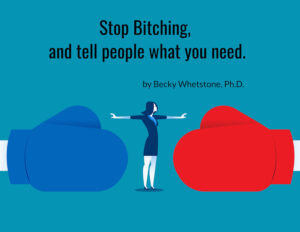The plight of the marriage therapist is to watch couples brawl – they bark, bray, hiss and throw lobs – all at the person they vowed to love, honor and cherish. If you know what you’re doing as a therapist, you won’t let that go on for long.
Therapists know nothing good will come from a back-and-forth heated discussion between two people. Pulses are up, and studies show that if pulse rates are over 100 beats per minute that it is impossible to retain information and interact.(1) Such intensity often leads a person into their most toxic self, where they’re likely to do more damage to the relationship, perhaps by hurling inaccuracies and exaggerations at the other person. This will escalate the madness into behaviors that are known to predict divorce.(2)
What is interesting about blistering arguments is that they can be stopped. Clients don’t know how to, but they need to learn. The process begins by stopping the spat and asking a couple of questions to yourself and to the other person:
1. What’s going on with you right now? (This asks you to focus on the feelings you’re having that are driving your distress.) i.e. “I’m mad that …” “I am scared that …”
2. What do you need?
Instead of, “You’re a workaholic!” or “You’re never home!” try, “I am feeling alone and in of need some quality time with you.”
Instead of, “I do everything with the house and family, and no one helps me!” try, “I am overwhelmed with all I do, and I need your help.”
Instead of “You can be such a bitch/asshole!” try, “It frightens me when your moods/emotions/words/anger are so intense. I need you to be soft and kind. What’s going on with you, what do you need?”
Anytime you feel chilly, grumpy, angry, tired, afraid, disgusted or want to withdraw or isolate, there is a reason why. This is the time for inquiry with yourself: “What’s going on with me? Why do I want to (Fill in blank here … get away, clobber, etc.,) from my spouse right now?”
When you figure out what is driving your mood, then ask yourself what you need. When I do the inquiry with myself, the thing I need is often something I can do for myself. For example, if I am exhausted, I may need to clear some space for rest. The important thing is, once you figure out what it is, create an action plan to take care of it. If it has to do with something that my partner is doing or not doing, I find a good time to talk with him, and then proceed with the questions (see below). This process is called self-care, and it’s the most important thing there is. It is the front door to mental and emotional health.
Mind, body, spirit health and teaching people how to attain it is my life passion, and not everyone is as mindful about it as I am, I get it. In the case of my partner, if I see he has fallen into a mood, I know he probably won’t be doing an inquiry, and it’s not my job to fix or instruct him or anyone without their permission. However, if he has fallen into a mood, that negatively affects us, it is appropriate for me to step in. So, I do the inquiry with him. I find a good time when he is relaxed, and come to him and say, “I have noticed you have been in a mood for a few days, what’s going on with you?” He is always able to tell me, as are almost all of the clients I ask, they’ll say, “I am crabby because … I am unhappy because … I am distant because … I have isolated myself because …” people can generally access the answers. The next question is, “Tell me what you need.”
Examples:
“I am crabby because of so many financial obligations right now, and what I need is for us to not spend any money on things we don’t absolutely need for a couple of months.”
“I am isolating because my husband has to have an answer to whatever it is right now, and he pursues me until I feel backed into a corner.”
Now we have something to work with. Most partners are eager to help with their partner’s needs and wants, I know I am. We love our partners and don’t want them to be in distress, and if we can help alleviate any negative feelings, most people would be all in. Of course, there may be some relational skills you need to learn in order to know how to handle situations peacefully, and that’s what marriage therapists are for.
For example, what do you do about a pursuing spouse?
I would tell the pursuer not to chase after someone who is flooded with negative emotion. You have to give them space to calm down so they can come back and speak to you when they are calm. The flooded person must then work to calm themselves down so they can return. The default time frame is 20 minutes, then return. If you are not able to achieve that, tell your partner, “I am having difficulty calming down. I promise to come back to discuss this within 24 hours.” Then, do it.
These are the sorts of things that no lay person would ever know, but they can learn it in marriage therapy. That is why I highly recommend that you learn basic marriage skills from a Licensed Marriage and Family Therapist, because they’re armed with many research-based arrows in their quiver that will help couples behave in functional ways as opposed to dysfunctional ones.
What is great about the inquiry technique is that it eliminates ugliness and brings two people together to have an adult conversation that is respectful. It helps them understand each other and make adjustments that will help them maintain their loving relationship in the days and weeks ahead. This process is bond building.
One more thing to watch out for is those who outwardly criticize things or people in the household or workplace that have little or nothing to do with what is really going on with them. Doing the inquiry is perfect for this.
Examples:
“I’m griping about my boss’s demands, but really I am just overwhelmed because I have put too much on my plate across the board.”
“I’m blaming the kids and my spouse for every little thing, when in fact I created this bad mood by procrastinating on doing things I needed to do and now I’m behind.”
It is really important that we stop blaming others for how we feel, and instead turn to ourselves and figure out what we need to do to be content. We are responsible for how our life is going. If the situation involves your partner and they won’t be there with and for you during your inquiry, and they aren’t open to negotiation and won’t be understanding or helpful, then you do indeed have a problem. In this case, see if a marriage therapist can help create a breakthrough. Not everyone has the maturity to do the inquiry, but most do, and that is great news.
2. The Four Horsemen of the Apocalypse of marriage – criticism, defensiveness, contempt & stonewalling. Gottman Institute.https://www.gottman.com/blog/the-four-horsemen-recognizing-criticism-contempt-defensiveness-and-stonewalling/





 Becky Whetstone is an Arkansas native and has a Ph.D. in Marriage and Family Therapy from St. Mary’s University in San Antonio, Texas. She is a Licensed Marriage and Family Therapist (LMFT) in Texas and Arkansas.
Becky Whetstone is an Arkansas native and has a Ph.D. in Marriage and Family Therapy from St. Mary’s University in San Antonio, Texas. She is a Licensed Marriage and Family Therapist (LMFT) in Texas and Arkansas. 



















































































































